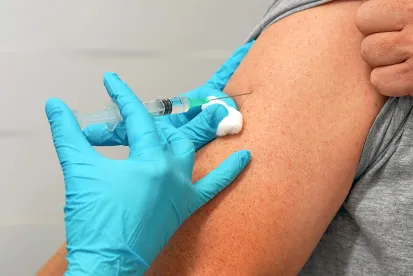On November 4, 2021, the Occupational Safety and Health Administration (OSHA) revealed its Emergency Temporary Standard (ETS) on COVID-19 Vaccination and Testing, which has been published in the Federal Register and is effective November 5, 2021. The ETS describes the "minimum" requirements regarding vaccinations, vaccination verification, face covering, and testing to prevent the spread of COVID-19 in the workplace.
Scope and Application of the ETS
-
The ETS applies to all employers, including those with a unionized workforce, covered by the federal OSH Act with a total of 100 or more employees firm- or corporate-wide (including part-time, minor, seasonal and temporary employees) at any time the ETS is in effect, except workplaces covered under the Safer Federal Workforce Task Force COVID-19 Workplace Safety: Guidance for Federal Contractors and Subcontractors (issued on September 24, 2021) or health care settings covered by specific requirements of COVID-19 Emergency Temporary Standard for Healthcare Settings (published on June 21, 2021).
-
The ETS does not prevent employers from implementing additional measures that exceed the minimum requirements.
-
The ETS requirements of vaccination or testing and masking do not apply to the employees of covered employers who (1) do not report to a workplace where other individuals are present, (2) work exclusively from home, and (3) work exclusively outdoors. However, the Department of Labor (DOL) has confirmed in their FAQs that (1) these employees are counted towards the 100-employee count threshold and (2) employees who mostly telework, but sometimes come into the workplace, are covered under the requirements of vaccination or testing and masking when they come into the workplace.
-
The ETS will preempt any inconsistent state or local laws, including laws that ban or limit an employer's authority to require vaccination, vaccination verification, face coverings, or testing.
-
States that wish to assume responsibility for the development and enforcement of standards that implement the ETS may submit a State Plan to OSHA for approval. State Plans are required to adopt and enforce standards that are "at least as effective" as federal OSHA's requirements. In addition, State Plans must cover state and local government employees (including, e.g., state and local school systems within the scope of the ETS). State Plans may choose to adopt more protective standards. Adoption of a State Plan that is at least as effective as the ETS must be completed within 30 days of Nov. 5, 2021, and State Plans must notify federal OSHA of the action they will take within 15 days.
Employer Vaccination Policy Options
Covered employers may establish, implement, and enforce one of two kinds of policies pursuant to the ETS:
-
A written mandatory vaccination policy under which all employees must be vaccinated (subject to certain exceptions); OR
-
A written policy allowing employees who are not fully vaccinated to elect to either choose to be fully vaccinated or provide proof of weekly testing and wear a face covering at the workplace.
Definition of "mandatory vaccination policy": The definition of mandatory vaccination policy excludes employees: (1) for whom a vaccine is medically contraindicated; (2) for whom medical necessity requires a delay in vaccination; or (3) who are legally entitled to a reasonable accommodation that does not cause the employer an undue hardship because they have a disability or sincerely held religious beliefs or practices that conflict with the vaccination requirement. (See our previous alert on this subject.)
Weekly testing: Covered employers must require each employee who is not fully vaccinated to get tested for COVID-19 (1) at least weekly if they are in the workplace at least once a week and (2) within 7 days prior to returning to the workplace if they are away from work for a week or longer. The ETS does not require covered employers to pay for the costs associated with testing, but payment may be required by other laws, regulations, collective bargaining agreements or contracts.
Covered employers must ensure that each employee who is not fully vaccinated properly wear a face covering when indoors and when occupying a vehicle with another person for work purposes, except in limited circumstances. Employers must not prevent any employee, customers, or visitors from wearing face coverings.
For employers who have already adopted a mandatory vaccination policy, OSHA recommends a review of current policy to ensure that it complies with the ETS minimum requirements.
Determination of Employee Vaccination Status
-
Covered employers must determine the vaccination status of each employee and require each vaccinated employee to provide acceptable proof of vaccination status.
-
The ETS describes acceptable records of vaccination status, including how employees can verify their vaccination status if they have lost a copy of their COVID-19 vaccination record card.
-
Employers that have determined the vaccination status of each employee prior to the effective date of the ETS are not required to re-evaluate vaccination status for fully vaccinated employees.
Support for Employees
-
Beginning on December 5th, covered employers must support COVID-19 vaccination by providing employees reasonable time, including up to 4 hours paid time (including travel time), to obtain the vaccine, as well as reasonable time and paid sick leave to recover from side effects.
-
Employers who have implemented a policy allowing employees to choose between vaccination or weekly testing must still provide paid time for vaccination and recovery.
-
Covered employers must inform each employee, in a language and at a literacy level the employee understands, about (1) the requirements of the ETS and the employer's policies and procedures established to implement the ETS; (2) the CDC guidance entitled "Key Things to Know About COVID-19 Vaccines"; (3) the prohibitions under the Occupational Safety and Health Act against retaliation and discrimination for reporting a work-related injuries or illness, exercising rights under, or acting as required by the law; and (4) the prohibitions under the law which provide criminal penalties for knowingly supplying false statements or documentation.
Notification & Reporting Obligations
Both employers and employees have notification and reporting obligations under the ETS:
-
Covered employers must: (1) require employees to provide prompt notification when they receive a positive COVID-19 test or are diagnosed with COVID-19 and (2) remove the infected employee, regardless of vaccination status, from the workplace until the employee receives a negative test, meets the CDC's return to work criteria, or is recommended to return to work by a licensed healthcare provider.
-
Covered employers must report work-related COVID-19 fatalities to OSHA within 8 hours, and work-related COVID-19 in-patient hospitalization within 24 hours, in accordance with OSHA reporting requirements.
Recordkeeping Requirements
The ETS also lays out several recordkeeping requirements, including:
-
Covered employers must keep records and proof of vaccination, and maintain a roster of employees' vaccination status. The roster must list all employees and clearly indicate for each one whether they are fully vaccinated, partially vaccinated, not fully vaccinated due to an accommodation, or not vaccinated because of another reason. These records are considered medical records and must be kept confidential pursuant to the Americans with Disabilities Act (ADA).
-
Employers must maintain a record of each test result obtained from employees who are not fully vaccinated and have opted to be tested every 7 days, including tests obtained and conducted by employers. These records are considered medical records and must be kept confidential pursuant to the Americans with Disabilities Act (ADA).
-
Covered employers must make available, by the end of the next business day after a request, to an employee or anyone having written authorized consent of that employee, the employee's COVID-19 vaccine documentation and test results.
-
Covered employers must also make available, by the end of the next business day after a request, to an employee or an employee representative the aggregate number of fully vaccinated employees at a workplace along with the total number of employees at that workplace.
-
A covered employer must provide to OSHA: (1) within 4 business hours of a request, the written vaccination policy and the aggregate numbers of fully vaccinated employees and employees at the workplace; and (2) by the end of the next business day after a request, all other records and documents required to be maintained by the ETS.
Penalties
-
The ETS permits OSHA to issue citations for willful or egregious failures to protect employees against the COVID-19 hazard.
-
The ETS will utilize OSHA's authority to issue a separate penalty for each violation of the ETS.
-
According to the OSHA website, penalties are typically $13,653 for every serious violation, but can be up to 10 times that amount if OSHA determines that the violation is willful or repeated.
-
However, the OSHA FAQs have indicated they will consider good faith measures regarding an employer's compliance.
Effective Date of the ETS (and other federal vaccine mandates)
-
The ETS is effective immediately upon publication in the Federal Register (November 5, 2021).
-
Covered employers must comply with all requirements, other than the testing requirements for employees who are not fully vaccinated, within 30 days after publication (December 5, 2021).
-
Covered employers must comply with the testing requirements for employees who are not fully vaccinated, within 60 days after publication (January 4, 2021).
Also on November 4, 2021, the Centers for Medicare and Medicaid Services issued its own emergency regulations that require specific types of Medicare and Medicaid-certified providers and suppliers to establish a process or policy to fulfill the staff vaccination requirements in the regulations.
Significantly, on November 4, the Biden Administration announced that the deadline for workers required to receive their vaccination shot under the federal contractor rules and CMS rules will be pushed until January 4, 2022, in order to keep the dates consistent with the new OSHA ETS.







 />i
/>i
